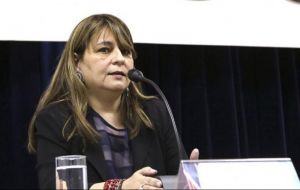MercoPress. South Atlantic News Agency
Argentina's revamped stats data launched: May inflation 4.2%
 “We are leaving a period where public confidence was destroyed and especially at Indec,” Mr. Todesca said Wednesday at a news conference.
“We are leaving a period where public confidence was destroyed and especially at Indec,” Mr. Todesca said Wednesday at a news conference.  “We have to give time to the index, probably a year to be able to do some type of evaluation,” said Ms. Bevacqua, who was briefly the agency’s technical director
“We have to give time to the index, probably a year to be able to do some type of evaluation,” said Ms. Bevacqua, who was briefly the agency’s technical director  Indec said the price for food and beverages was up 3.7%; transportation and communications 5.6%; housing 5.2% and other goods and services rose 16.1%.
Indec said the price for food and beverages was up 3.7%; transportation and communications 5.6%; housing 5.2% and other goods and services rose 16.1%. Argentina released inflation figures for the first time since December last year, when newly elected president Mauricio Macri suspended the publication of economic data and intervened the official stats office, Indec, following long standing claims of manipulation by his predecessor.
Indec on Wednesday said consumer prices rose 4.2% in May from the previous month, driven by higher food, transportation and housing costs. Indec said the price for food and beverages was up 3.7%, while transportation and communications rose 5.6%, housing increased 5.2% and other goods and services rose 16.1%.
President Macri said he aims to restore confidence in the statistics agency’s inflation tabulations, a vital part of his effort to overhaul former president Cristina Fernandez populist policies and fix the Argentine economy.
Economists say consumer prices soared under Cristina Fernandez governments, with leading officials allegedly tampering with the real inflation figures. This led to the release of the so called Congress Index, an average of private consultants' estimates who were threatened with fines and criminal charges if they revealed their percentages.
Provinces not ruled by Kirchnerism had their own stats, as well as the unions since the Indec figures were so discredited.
The new inflation figure “appeared to be a much closer representation of the true rate of inflation than the previous, widely discredited, series,” said Capital Economics.
In 2013, the IMF issued an unprecedented declaration of censure and demanded that Argentina clean up its act (inflation and economic growth) to meet international standards or lose its membership. Economic growth was also manipulated to pay lower interests on bonds tied to the performance of the Argentine economy.
Indec Director Jorge Todesca said an IMF mission would meet with officials in the coming months to discuss the changes at the agency. After his appointment in December, he said he found an agency in disarray, forcing the suspension of the publication of economic data.
“We are leaving a period where public confidence was destroyed and especially at Indec,” Mr. Todesca said Wednesday at a news conference. “We are just at the beginning of a road. A lot needs to be built.”
Inflation figures allow companies to budget, unions to plan wage negotiations and the state to better direct social services by determining the poverty rate.
Graciela Bevacqua, a mathematician who said she lost her job at Indec during the Kirchner administration for refusing to doctor data, said it will probably take a while to evaluate the accuracy of the new index and restore confidence in the agency’s figures.
“We have to give time to the index, probably a year to be able to do some type of evaluation,” said Ms. Bevacqua, who was briefly the agency’s technical director at the beginning of Mr. Macri’s term before leaving over a dispute on when to publish the new inflation figures.
Consumer prices have continued to increase this year as the government raises transportation and utility prices, economists say. In May, Congress estimated that the consumer prices rose about 3.5%. That brought the 12-month inflation rate to more than 40%, according to Elypsis, an economic research firm.




Top Comments
Disclaimer & comment rules-

-

-

Read all commentsOf course foreign investment will flow massively into a country with a still-hostile anti-business environment, an unwilling proletariat more inclined to strike than to work, a legislature dominated by leftist Peronistas, massive corruption, a state-sponsored catholic church working against profitable enterprises, and 44 percent annual inflation. What could possibly go wrong?
Jun 16th, 2016 - 01:37 pm 04.2% inflation is not bad, lots of stable countries have inflation rates that reach this level in stressful years.
Jun 16th, 2016 - 10:04 pm 0@2 Lots of stable countries have 4.2% inflation per year. Unfortunately Argentina had 4.2% in only the last month.
Jun 16th, 2016 - 10:49 pm 0Commenting for this story is now closed.
If you have a Facebook account, become a fan and comment on our Facebook Page!